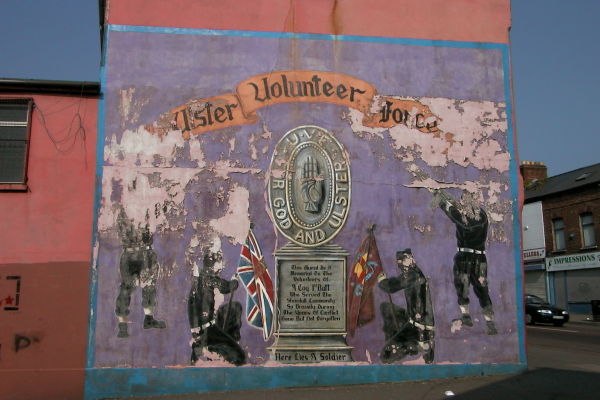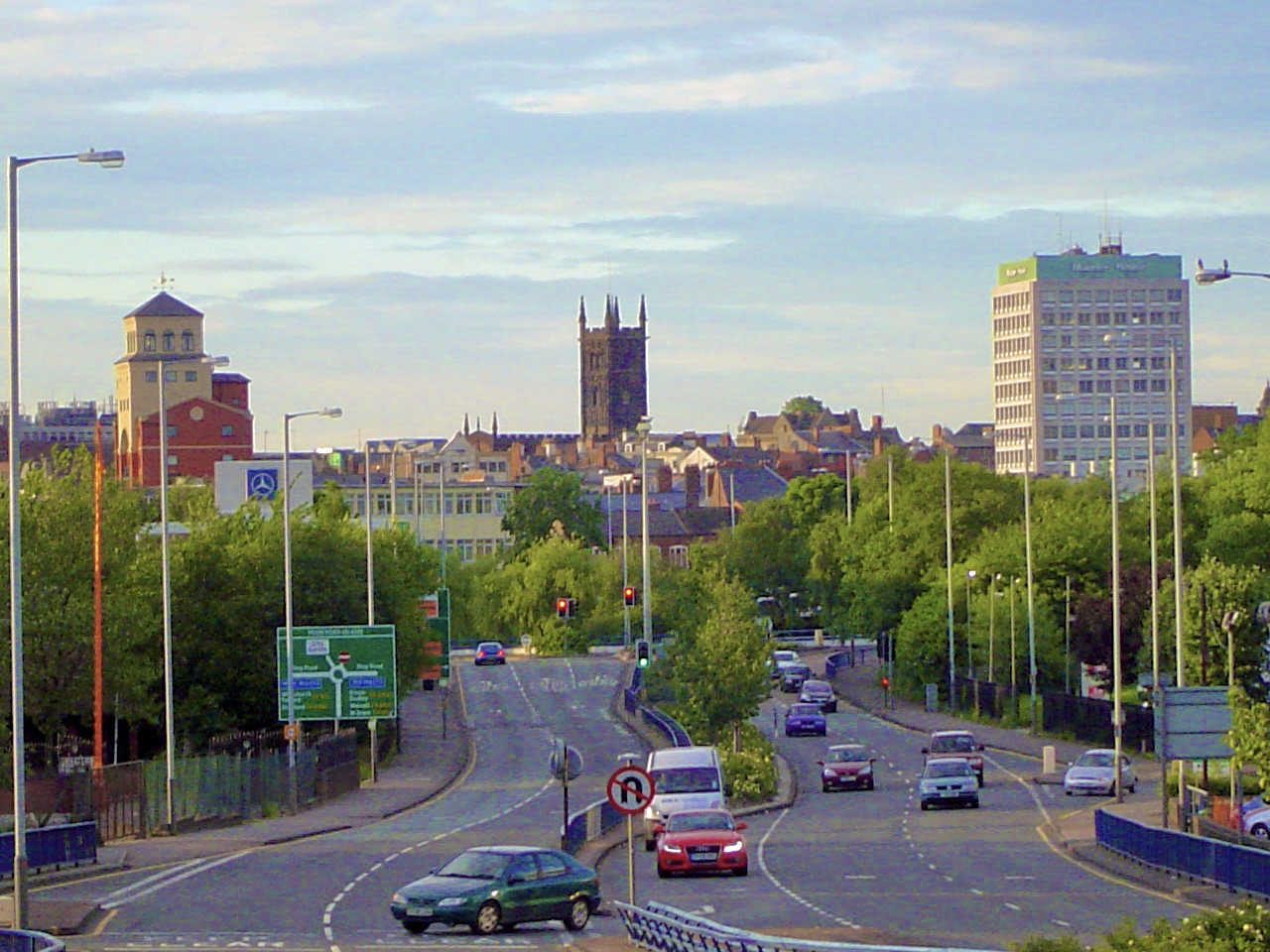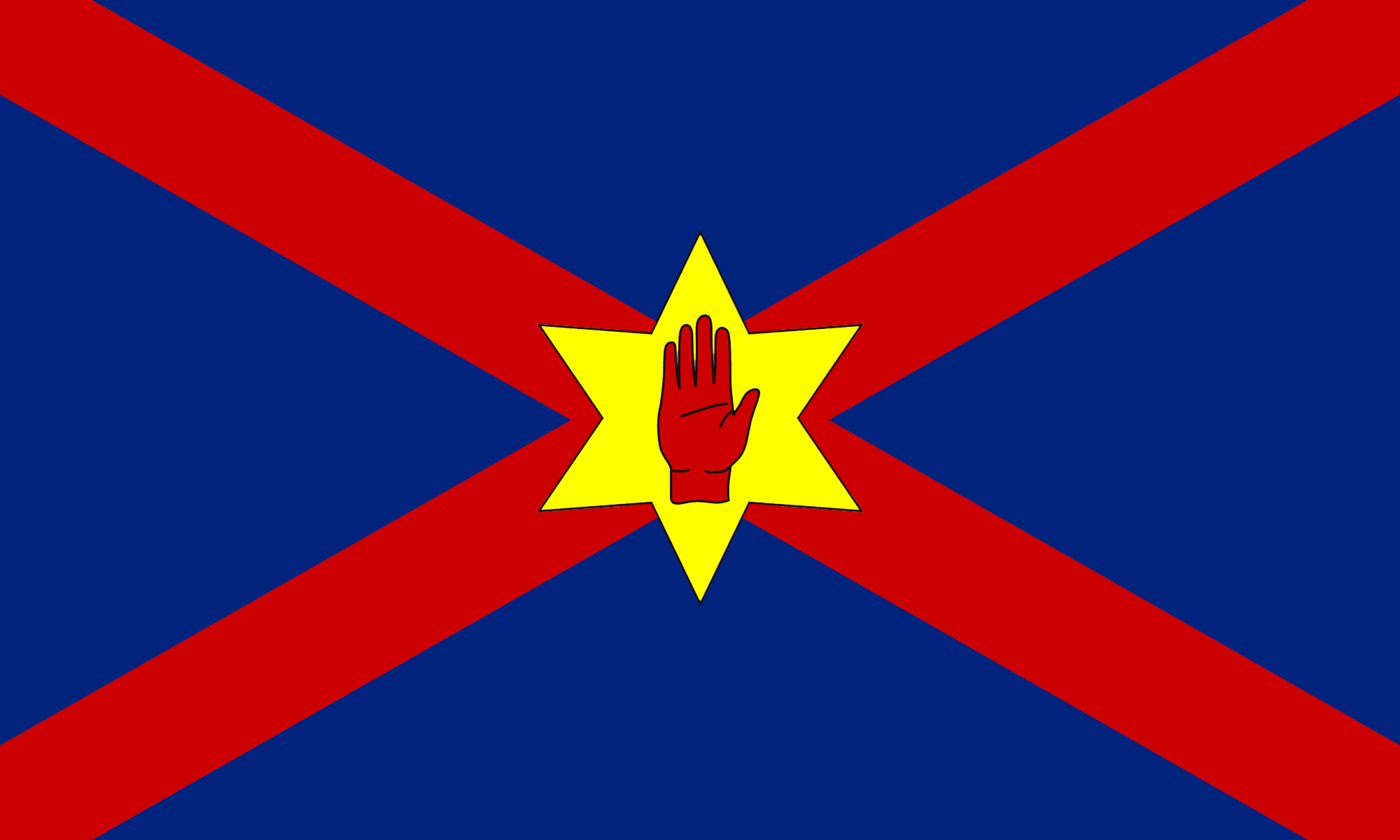|
Ulster Loyalist Central Co-ordinating Committee
The Ulster Loyalist Central Co-ordinating Committee (ULCCC) was set up in 1974 in Belfast, Northern Ireland in the aftermath of the Ulster Workers Council Strike, to facilitate meetings and policy coordination between the Ulster Workers Council, loyalist paramilitary groups, and the political representatives of Ulster loyalism. Original version Seen as an important link between grassroots loyalism and more mainstream unionist politics, the ULCCC was chaired by Glenn Barr and met in the Belfast offices of the Vanguard Progressive Unionist Party on a weekly basis. Replacing the earlier Ulster Army Council, it brought together representatives of the Ulster Defence Association (UDA), Ulster Volunteer Force (UVF), Red Hand Commando, Vanguard Service Corps/Ulster Volunteer Service Corps, Down Orange Welfare (DOW), Loyalist Association of Workers and Orange Volunteers. Barr was soon replaced as chairman by John McKeague and the ULCCC took on the wider aim of preparing for the establishme ... [...More Info...] [...Related Items...] OR: [Wikipedia] [Google] [Baidu] |
Belfast
Belfast ( , ; from ga, Béal Feirste , meaning 'mouth of the sand-bank ford') is the capital and largest city of Northern Ireland, standing on the banks of the River Lagan on the east coast. It is the 12th-largest city in the United Kingdom and the second-largest in Ireland. It had a population of 345,418 . By the early 19th century, Belfast was a major port. It played an important role in the Industrial Revolution in Ireland, briefly becoming the biggest linen-producer in the world, earning it the nickname "Linenopolis". By the time it was granted city status in 1888, it was a major centre of Irish linen production, tobacco-processing and rope-making. Shipbuilding was also a key industry; the Harland and Wolff shipyard, which built the , was the world's largest shipyard. Industrialisation, and the resulting inward migration, made Belfast one of Ireland's biggest cities. Following the partition of Ireland in 1921, Belfast became the seat of government for Northern Ireland ... [...More Info...] [...Related Items...] OR: [Wikipedia] [Google] [Baidu] |
John McKeague
John Dunlop McKeagueWD Flackes & Sydney Elliott, ''Northern Ireland A Political Directory 1968–1993'', The Blackstaff Press, 1994, p. 222 (1930 – 29 January 1982) was a Northern Irish loyalist and one of the founding members of the paramilitary group the Red Hand Commando in 1970.Martin Dillon, ''The Dirty War'', p. 200 Authors on the Troubles in Northern Ireland have accused McKeague of involvement in the Kincora Boys' Home scandal but he was never convicted. He was shot dead by the Irish National Liberation Army (INLA) in Belfast in January 1982. McKeague and Ian Paisley A native of Bushmills, County Antrim, McKeague, who long had a reputation for anti-Catholicism, became a member of Ian Paisley's Free Presbyterian Church in 1966.Ed Moloney, ''Paisley: From Demagogue to Democrat?'', Poolbeg, 2008, p. 152 McKeague and his mother moved to east Belfast in 1968, where he became a regular at Paisley's own Martyrs' Memorial Church on the Ravenhill Road and joined the Willowfie ... [...More Info...] [...Related Items...] OR: [Wikipedia] [Google] [Baidu] |
Niwot, Colorado
Niwot is an unincorporated town, a post office, and a census-designated place (CDP) located in and governed by Boulder County, Colorado, United States. The CDP is a part of the Boulder, Colorado Metropolitan Statistical Area. The Niwot post office has the ZIP Codes 80503 and 80544 (for post office boxes). At the United States Census 2020, the population of the Niwot CDP was 4,306. History Niwot is named for Arapaho Chief Niwot, a tribal leader in the Boulder area during the nineteenth century. The name means "left-handed". This locality is recognized for being the headquarters of footwear company Crocs, Inc. for more than a decade prior to June 2020. Geography Niwot is located along State Highway 119, halfway between Boulder and Longmont. The Niwot CDP has an area of , including of water. Climate Demographics As of the 2020 census, there were 4,306 people and 1,541 households residing in the CDP. The population density was 1,076.5 people per square mile. The racial m ... [...More Info...] [...Related Items...] OR: [Wikipedia] [Google] [Baidu] |
Robin Jackson
Robert John Jackson (27 September 1948 – 30 May 1998), also known as The Jackal, was a Northern Irish loyalist paramilitary and part-time soldier. He was a senior officer in the Ulster Volunteer Force (UVF) during the period of violent ethno-nationalist conflict in Northern Ireland known as the Troubles. Jackson commanded the UVF's Mid-Ulster Brigade from 1975 to the early 1990s, when Billy Wright took over as leader. From his home in the small village of Donaghcloney, County Down, a few miles south-east of Lurgan, Jackson is alleged to have organised and committed a series of killings, mainly against Catholic civilians, although he was never convicted in connection with any killing and never served any lengthy prison terms. At least 50 killings in Northern Ireland have been attributed to him, according to Stephen Howe (in the ''New Statesman'' magazine) and David McKittrick (in his book ''Lost Lives''). An article by Paul Foot in ''Private Eye'' suggested that Jac ... [...More Info...] [...Related Items...] OR: [Wikipedia] [Google] [Baidu] |
Billy Wright (loyalist)
William Stephen Wright (7 July 1960 – 27 December 1997) was a Northern Irish loyalist paramilitary leader during the Troubles. He joined the Ulster Volunteer Force (UVF) in his hometown of Portadown around 1975. After spending several years in prison, he became a born again Christian preacher. Wright resumed his UVF activities around 1986 and became commander of its Mid-Ulster Brigade in the early 1990s, taking over from Robin "the Jackal" Jackson. According to the Royal Ulster Constabulary, Wright was involved in the sectarian killings of up to 20 Catholics, although he was never convicted for any. It has been alleged that Wright, like his predecessor, was working with RUC Special Branch. Wright drew media attention during the Drumcree standoffs of 1995 and 1996, when he supported the Protestant Orange Order in its bid to march its traditional route through the Catholic area of Portadown. In 1994, the UVF and other paramilitary groups had called ceasefires. However, ... [...More Info...] [...Related Items...] OR: [Wikipedia] [Google] [Baidu] |
Royal Ulster Constabulary
The Royal Ulster Constabulary (RUC) was the police force in Northern Ireland from 1922 to 2001. It was founded on 1 June 1922 as a successor to the Royal Irish Constabulary (RIC)Richard Doherty, ''The Thin Green Line – The History of the Royal Ulster Constabulary GC'', pp. 5, 17, 27, 93, 134, 271; Pen & Sword Books; following the partition of Ireland. At its peak the force had around 8,500 officers, with a further 4,500 who were members of the RUC Reserve. The RUC policed Northern Ireland from the aftermath of the Irish War of Independence until after the turn of the 21st century, and played a major role in the Troubles between the 1960s and the 1990s. Due to the threat from the Provisional Irish Republican Army (IRA), who saw the RUC as enforcing British rule, the force was heavily armed and militarised. Officers routinely carried submachine guns and assault rifles, travelled in armoured vehicles, and were based in heavily-fortified police stations.Weitzer, Ronald. ''Policin ... [...More Info...] [...Related Items...] OR: [Wikipedia] [Google] [Baidu] |
Hugh Ross (Northern Ireland Politician)
Hugh Ross (born c. 1944) is a Presbyterian minister and member of the Orange Order, who was previously the leader of the now defunct Ulster Independence Movement (UIM). UIM leadership Ross began his political involvement with the Ulster Clubs which emerged in the 1980s to galvanise opposition to the Anglo-Irish Agreement and appeared on the BBC's local news programme in August 1986 to launch an attack on cross-border co-operation. Eventually the UIM developed out of this group and Ross became leader of the main avowedly Ulster nationalist organisation in Northern Ireland's history. Ross enjoyed relatively high vote shares as a candidate at both the Upper Bann by-election of 1990 and the 1994 European elections. He headed the list for the UIM at the 1996 elections for the Northern Ireland Forum (a precursor to the Northern Ireland Assembly) although he failed to get elected and has since largely left politics, emerging from time to time to write articles for the Ulster Third Wa ... [...More Info...] [...Related Items...] OR: [Wikipedia] [Google] [Baidu] |
Ulster Independence Movement
The Ulster Independence Movement was an Ulster nationalist political party founded (as the Ulster Independence Committee) on 17 November 1988. The group emerged from the Ulster Clubs, after a series of 15 public meetings across Northern Ireland. Led by Hugh Ross, a Presbyterian minister from Dungannon, County Tyrone, the UIC sought to end what it saw as the tyranny of rule from London (and potentially Dublin) and instead set up an independent Northern Ireland. Early development The UIC initially had a network of 11 branches and first entered the political arena in 1990 when Ross stood in a by-election for the Upper Bann constituency following the death of sitting MP Harold McCusker. Finishing as fourth out of eleven candidates with 1534 votes (4.3%) (and ahead of the Alliance Party of Northern Ireland candidate), the result indicated to the UIC that there was potential for an Ulster nationalist party. The Committee reconstituted itself in 1994 as a full political party (lar ... [...More Info...] [...Related Items...] OR: [Wikipedia] [Google] [Baidu] |
Ulster Bank
Ulster Bank ( ga, Banc Uladh) is a large retail bank, and one of the traditional Big Four Irish clearing banks. The Ulster Bank Group is subdivided into two separate legal entities: National Westminster Bank, trading as Ulster Bank (registered in England and Wales and operating in Northern Ireland); and Ulster Bank Ireland dac (UBIDAC – registered in the Republic of Ireland). The headquarters of Ulster Bank in the Republic of Ireland are located on George's Quay, Dublin, whilst the headquarters of Ulster Bank Northern Ireland are in Donegall Square East, Belfast, and it maintains a large sector of the financial services in both the UK and the Republic of Ireland. Established in 1836, Ulster Bank was acquired by the London County and Westminster Bank in 1917. As a wholly-owned subsidiary of National Westminster Bank (NatWest), it became part of the Royal Bank of Scotland Group (RBS Group) in 2000. RBS Group was renamed NatWest Group in 2020. However, the Ulster Bank brand is ... [...More Info...] [...Related Items...] OR: [Wikipedia] [Google] [Baidu] |
Combined Loyalist Military Command
The Combined Loyalist Military Command is an umbrella body for loyalist paramilitary groups in Northern Ireland set up in the early 1990s, recalling the earlier Ulster Army Council and Ulster Loyalist Central Co-ordinating Committee. Bringing together the leaderships of the Ulster Defence Association, the Ulster Volunteer Force and the Red Hand Commando, the CLMC sought to ensure that the groups would work towards the same goals. The group was made up of a number of 'Liaison Officers' who were senior figures from the paramilitary groups themselves, as well as from the Ulster Democratic Party and the loyalist Progressive Unionist Party. The UDP was made up of representatives from UDA and the PUP was made up of representatives from both the RHC and UVF. 1991 Ceasefire The CLMC first tested the idea of a ceasefire in 1991 when it called a halt to all action from 29 April to 4 July of that year. The only breach of the 10-week ceasefire was the killing by the Ulster Freedom Fighters ... [...More Info...] [...Related Items...] OR: [Wikipedia] [Google] [Baidu] |
Provisional Irish Republican Army
The Irish Republican Army (IRA; ), also known as the Provisional Irish Republican Army, and informally as the Provos, was an Irish republican paramilitary organisation that sought to end British rule in Northern Ireland, facilitate Irish reunification and bring about an independent, socialist republic encompassing all of Ireland. It was the most active republican paramilitary group during the Troubles. It saw itself as the army of the all-island Irish Republic and as the sole legitimate successor to the original IRA from the Irish War of Independence. It was designated a terrorist organisation in the United Kingdom and an unlawful organisation in the Republic of Ireland, both of whose authority it rejected. The Provisional IRA emerged in December 1969, due to a split within the previous incarnation of the IRA and the broader Irish republican movement. It was initially the minority faction in the split compared to the Official IRA, but became the dominant faction by 1972. T ... [...More Info...] [...Related Items...] OR: [Wikipedia] [Google] [Baidu] |
Ulster Democratic Party
The Ulster Democratic Party (UDP) was a small loyalist political party in Northern Ireland. It was established in June 1981 as the Ulster Loyalist Democratic Party by the Ulster Defence Association (UDA), to replace the New Ulster Political Research Group. The UDP name had previously been used in the 1930s by an unrelated party, which on one occasion contested Belfast Central. History The party's roots were firmly in the Protestant community of Northern Ireland, but its initial political stance was not the traditional unionist one favoured by that section of society. Instead, it supported independence for Northern Ireland within the European Economic Community and the Commonwealth. These policies had been set out by its predecessors in the New Ulster Political Research Group, in their ''Beyond the Religious Divide'' policy document. However, this position did not capture the electorate's imagination, and the UDP switched to supporting the UDA's ''Common Sense'' position, whi ... [...More Info...] [...Related Items...] OR: [Wikipedia] [Google] [Baidu] |
.png)




